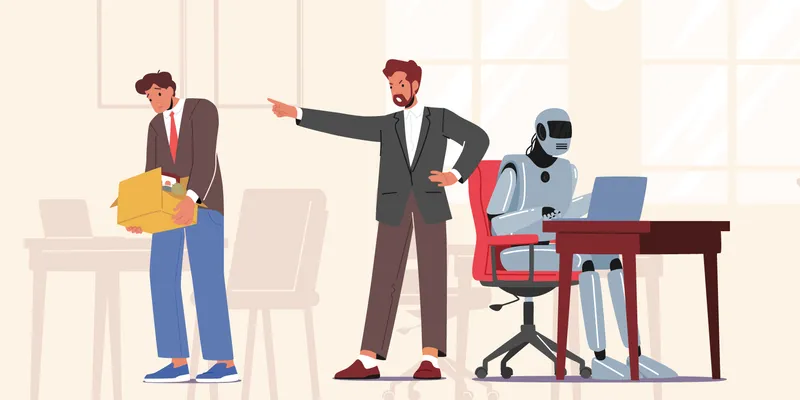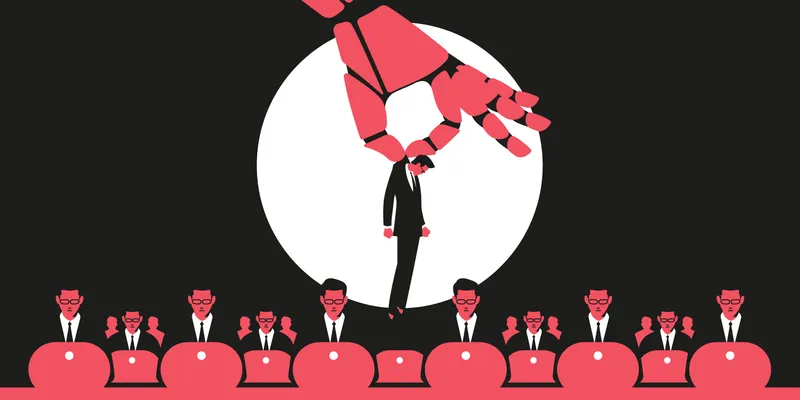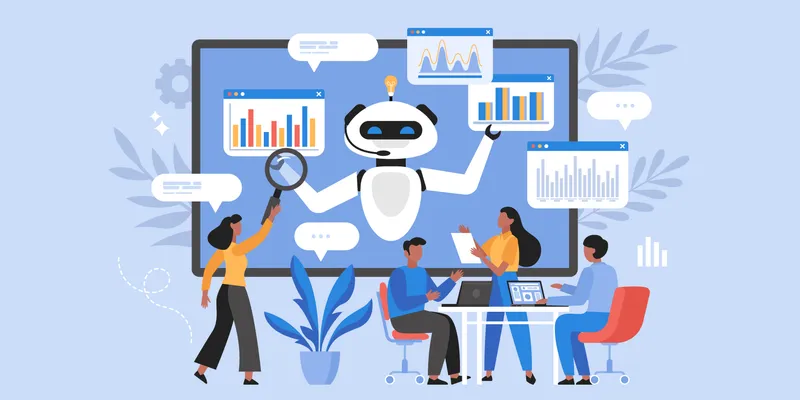AI anxiety: Workers’ love-hate relationship with the technology
Dr Gorav Gupta Psychiatrist and Co-founder of Emoneeds, a mental health platform providing psychiatric services and therapy, explains that AI anxiety refers to the apprehension or fear associated with artificial intelligence's increasing presence and capabilities.
As artificial intelligence (AI) continues to advance, job-specific anxiety in India intensifies, with concerns centering around potential displacements and transformations in various industries, prompting a reassessment of workforce dynamics and skill requirements.
The above paragraph was generated using a generative AI (GenAI) tool. The rest of the article isn’t written by AI, but it very well could be.
According to Microsoft’s Work Trend Index 2023 report, which was released in June, around 74% of Indian workers say they are worried that AI might replace them from their jobs.
How real are these fears and how does one cope with them? SocialStory tries to find out.
A complicated relationship
Shruti Jain, a 21-year-old PR professional, found herself running against time as she struggled to craft the perfect headline for a press release. With a looming deadline, she turned to ChatGPT for assistance. Within moments, she had several headline options.
“That is when the self-doubt kicked in. This instance forced me to question that what will happen if AI can effortlessly do my job,” she tells SocialStory.
Jain’s work involves tasks like crisis management, managing media relations, and creating brand strategies and campaigns. Her role involves a lot of creativity, writing, spontaneity, and emotional intelligence.
Though she uses AI-based tools like ChatGPT and Bard on days when her creative skills are not at their best, she also believes that these tools cannot fully replace her role.
“It's quite a love-hate relationship with AI for now. These tools ease my job but when I think of AI advancing even further, it makes me feel insecure,” she adds.

Around 74% of Indian workers say they are worried that AI might replace them from jobs.
In recent years, as generative AI tools like ChatGPT have arrived, many people have started to fear losing relevance in the labour market. Dr Gorav Gupta, Psychiatrist and Co-founder of Emoneeds, a mental health platform providing psychiatric services and therapy, explains that AI anxiety refers to the apprehension or fear associated with the increasing presence and capabilities of artificial intelligence. It encompasses concerns about job displacement, loss of privacy, and potential misuse of AI.
He adds that common signs and symptoms of AI-related stress and anxiety in individuals may include heightened concerns about job security or increased worry about data breaches.
“Sleep disturbances, excessive news consumption about AI, and social withdrawal can be other indicators. It’s important to note that these symptoms can vary in intensity,” Gupta adds.
Agreeing, Dr. Meenakshi Jain, Consultant, Department of Psychiatry, Amrita Hospital in Faridabad recalls a case where a 36-year-old web designer complained of palpitations. After undergoing multiple tests it was found that he had anxiety.
Further, it was revealed that the man had a stable career and was the only breadwinner of the family. But recently, two of his colleagues lost their jobs due to AI. He worried about not being able to provide for his family in the future if he also lost his job. The difficulty of learning new skills, particularly given his age, heightened his fear that losing his job could make it hard to find new employment.
Mansi Poddar, a psychotherapist and founder of the Heal. Grow. Thrive Foundation says, “For humans, work is not only survival but also their life purpose and calling. To feel that one day they would be rendered useless can be terrifying. AI-based technology has made these fears obvious and real for many.”
Utkarsh Pandit works at a SaaS company and deals with customer relationship management (CRM) and consumer engagement and care. The company is actively integrating AI into its consumer relationship management efforts to address client needs and concerns. The focus has been to make the AI model self-sufficient to deal with basic consumer requests.
“I feel that though AI is not replacing the entire workforce it does have the potential to reduce workforce dependency on humans. However, given that AI models require to be trained and monitored by skilled individuals, humans remain irreplaceable in the workforce, but there will undoubtedly be a shift toward a reduced reliance on manual labor in the years to come,” he adds.
Closing doors or opening new ones?
Many believe that AI advancements are providing people with the opportunity to upskill themselves and use it to their advantage.
Elucidating a similar thought, Sahil Choudhary, Founder of Autoflow, a startup focused on automating application testing using AI, explains that AI is being used in the tech industry to replace repetitive work which can save time of an employee to do more specialised tasks.
“In the tech industry, AI is currently helping engineers focus on complex problems by automating the simple ones. It’s a tool that people use to be efficient and faster,” he says.
He acknowledges the potential for AI to advance to a point where jobs can either be lost or changed. However, he asserts that this technological shift will also give rise to new employment opportunities.
“For instance, with the expanding role of AI in product teams, AI prompt engineers will be required who will specialise in creating text-based prompts or cues that can be interpreted and understood by large language models and generative AI tools,” he adds.
Syed Nazakat, Founder and CEO of , a digital media and tech company based in New Delhi, says that AI has the potential to automate routine, repetitive tasks, which could in particular lead to the displacement of certain jobs in office support, customer service and finance sectors. However, he does not discount the fact that highly skilled occupations are also exposed to AI-powered automation.
“But at the same time, the rise of AI will create new job roles that involve designing, implementing, and maintaining new systems,” he adds.
As per Indeed’s AI at Work Report: How GenAI Will Impact Jobs and the Skills Needed to Perform Them report, the roles filled by knowledge workers are potentially the most exposed to change from generative AI and the ones that require manual skills and/or deep personal connections are unlikely to be replaced.
The report found out that driving roles face the lowest potential exposure to skills GenAI could reasonably replace while software development roles face the highest potential exposure.

Many believe that AI advancements are providing people with the opportunity to upskill themselves.
Seconding the above, Shravan Shetty, a career coach, says that nowadays more and more students are inclined towards professions centered around "empathy " like counselling, social work, healthcare, arts and more.
“There are many professions where the human element cannot be replaced by AI and technology. Moreover in this digital age, people are valuing human connections more than ever. So many young individuals are breaking away from traditional career expectations, expressing a strong desire for paths that embody empathy,” he adds.
Nazakat explains, “While AI can handle many routine tasks, human skills such as creativity, critical thinking, emotional intelligence, and complex problem-solving remain highly valuable.”
Embrace uncertainty
Poddar believes that all disruptive technologies have always caused anxiety. So it is important to also see AI as a supportive tool. She suggests recognising that AI cannot fully replicate human depth, and emotional intelligence, and gain specialisation in the aspects of the job that AI cannot reproduce. And, instead of viewing AI as a competitor, one needs to consider it a creative partner.
“AI can assist in generating ideas, analysing data, and streamlining processes, allowing professionals to focus on the elements that require human ingenuity,” she adds.
To deal with AI-related stress, Dr Gupta suggests that people stay informed through reliable sources to gain a better understanding of AI and be less fearful of the unknown. Engaging in mindfulness and relaxation techniques or seeking support from peers, mental health professionals, or AI ethics experts can provide emotional relief and more clarity.
He also suggests that employers and businesses should prioritise transparent communication about AI adoption, addressing concerns and providing reassurance to employees. Furthermore, providing access to mental health resources and support, including counseling or stress management programs, is crucial.
“Offering cognitive-behavioral therapy (CBT) techniques can help individuals reframe negative thoughts about AI and develop coping strategies. Additionally, spreading the right information about AI technology, its capabilities, and its limitations can reduce irrational fears. Mental health professionals can also guide individuals in setting healthy boundaries with technology and managing information overload,” he adds.
He adds that on the personal front, one can acquire new skills that align with the changing job market. Moreover, employers can offer regular training and upskilling opportunities to help alleviate their job insecurity.

Roles filled by knowledge workers are potentially the most exposed to change
Agreeing, Choudhary believes that to deal with the rapid adoption of AI, people require to learn about the technology, and its impact on their profession and upskill them through training courses accordingly.
“The mantra is to adapt and align skills to the opportunities within the field of AI,” Shetty adds.
Feeling daunted by the impact of competitive AI tools in the field of public relations Debasmita Ray, Reputation Manager, The Mavericks, has lately started studying courses like– Understanding Prompt Engineering, ChatGPT– Complete Guide and more.
“Amid this transformation, we must see this an opportunity for personal and professional growth. Embracing upskilling can become my compass through uncertainty, offering me the tools to navigate the evolving technology landscape. By acquiring new skills, I am not only fortifying my standing but also transforming AI into an ally,” she says.
Calling AI a “significant part of the future”, Nazakat says that it is no longer useful to debate whether AI is going to be smarter or better than human beings.
“It will continue to grow and reshape the job landscape worldwide. Therefore it is important that we embrace AI by investing time and resources in acquiring new skills and approaches like technical skills, such as programming or data analysis, as well as soft skills like critical thinking and adaptability. It is crucial that we cultivate a mindset of adaptability and openness to embrace AI,” he says.
(The article was updated to describe mental health startup Emoneeds.)
Edited by Affirunisa Kankudti








